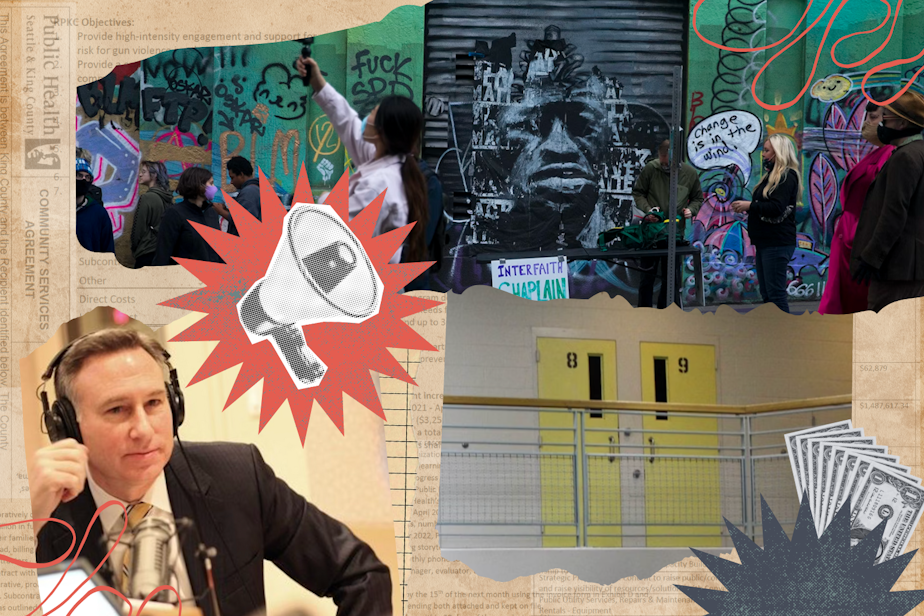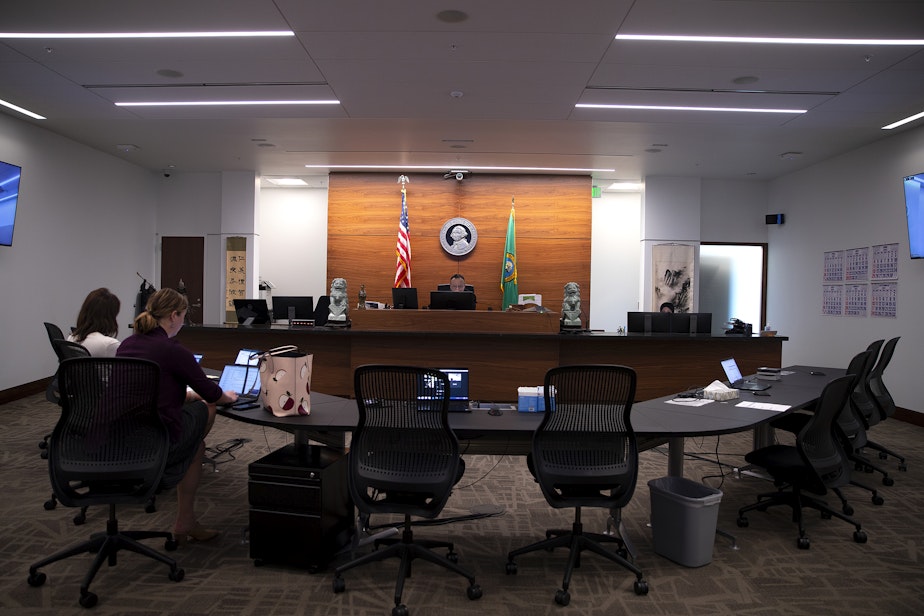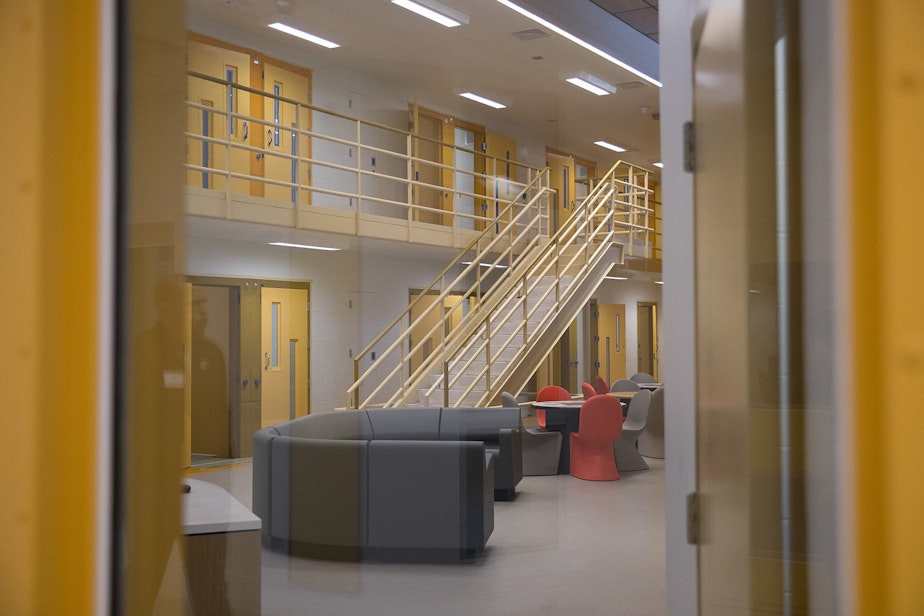King County gave millions to ‘No New Youth Jail’ activists to help kids — and then looked away

On a Sunday morning last November, an 18-year-old named Seattle Savior Wheeler crouched behind a bed, clutching a gun.
He was at his cousin’s apartment in Rainier Valley, where, prosecutors say, his cousin’s ex had just kicked in the front door and was holding her new boyfriend at gunpoint on the floor. Wheeler jumped up from behind the bed and fired several times, wounding the ex, 39-year-old Khalid Adams.
Seattle Savior Wheeler and Khalid Adams had a connection beyond the apartment: Both were part of Community Passageways, an organization King County funds to prevent youth gun violence, crime, and jail time in King County.
Wheeler was one of the youth Community Passageways promises to help. Adams was a staff member; his official title was “violence interrupter.”
Adams is currently in King County Jail awaiting trial. He is one of several staffers at Community Passageways with active restraining orders against them.
Wheeler was not charged.
Sponsored
C
ommunity Passageways is one of 18 nonprofits that King County has contracted or subcontracted to prevent youth gun violence and incarceration through two county programs.
The county and City of Seattle have so far earmarked $28 million for these two programs. The programs launched in 2021 in response to the “No Youth Jail” protests against the county’s new youth detention facility, the racial justice uprising following the police murder of George Floyd in Minneapolis, and a spike in local shootings.
The goal: Heal kids and keep them out of what some call the “criminal punishment” system.
Sponsored
Both programs refer youth to local nonprofits for support and services, including healing circles, mentorship, art therapy and cultural programming. Youth may also receive referrals to mental health care, housing support, and direct financial support if they or their families need help.
The programs have specific goals: Regional Peacekeepers focuses on preventing youth gun violence. Restorative Community Pathways is a diversion program that sends lower-level juvenile cases — mostly misdemeanors, up to offenses like burglary, car theft, and gun charges — to community organizations, rather than to court.
But two years later, the county acknowledges that it knows little of what these nonprofits do with the money they receive. The county was unable to provide KUOW data about the number of youth who have completed the diversion process. Nor has the county known about recent felony charges against some staff.
The county’s hands-off approach to how these programs manage individual cases is by design and by demand.
“We don’t need to know how things are going,” Jimmy Hung, who heads the juvenile division of the King County Prosecuting Attorney’s Office, told KUOW last summer. Hung is a proponent of Restorative Community Pathways.
“We’ll know if things haven’t gone right because the kid has committed another crime, and then we’ll address that, if and when it happens,” Hung said.
Sponsored
RELATED: New youth program divides candidates for King County prosecutor
"This work is about removing power from the County and returning it to communities,” says the county’s evaluation plan for Restorative Community Pathways.
King County Executive Dow Constantine, who heralded this initiative to keep kids out of the courts, declined interview requests. His communications director answered questions by email.

Sponsored
A
criminal history or prior gang involvement are considered job qualifications for the youth outreach work that’s fundamental to the county’s crime prevention programs. The theory is that the young people they’re trying to reach will relate better to caseworkers who are “credible messengers” with similar backgrounds, and whose advice comes from personal experience.
Having formerly incarcerated people counsel youth is growing in popularity nationwide as a method of court diversion.
King County sets no limits on which criminal convictions contractors who work with youth may have, a spokesperson said, nor how long it’s been since the conviction or their release from prison.
The county does not typically conduct background checks on employees in organizations it contracts with, even if those employees work with children, said Kate Cole, a county spokesperson.
The county began asking the nonprofits to conduct their own background checks after KUOW started asking questions last summer. Some of these background checks appear to be looser than others: Khalid Adams, who stormed his ex’s apartment, was hired as a “violence interrupter” in 2022, one year after a firearms conviction.
Background checks are critical for such programs, said Norman Brown, who manages one of the largest similar programs in the country, the Credible Messengers Initiative, for the Department of Youth Rehabilitation Services in Washington, D.C.
(We'd like to hear about experiences you have with these diversion programs. Please contact reporter Ann Dornfeld, adornfeld@kuow.org)
Sponsored
Before hiring a youth mentor, Brown said, the Credible Messengers Initiative in D.C. runs “a community background check, to make sure that the people who are interested don't have one foot in the streets — which is criminal behavior — and one foot on the side of trying to be a transformative mentor.”
Only then does his agency run a formal criminal background check, Brown said. Once mentors are hired, they are subject to random background checks every six months.
“Since 2016, we may have only had two or three cases where someone may have gotten into trouble” after being hired as mentors, Brown said.
Such hiring stipulations are standard for effective crime prevention programs, said George Knox, head of the National Gang Crime Research Center, who has evaluated dozens of similar programs for the federal government.
“It's usually a period that they establish, like three years of successful adjustment off of probation, off of parole, to demonstrate that you're no longer in immediate risk of being a recidivist,” Knox said — that is, that the applicant is unlikely to reoffend.
Jasmine Vail, spokesperson for the county’s Restorative Community Pathways program, said that each of the organizations it oversees “has its own requirements regarding background checks and disqualifying criminal convictions.”
Asked what would disqualify someone from working with these vulnerable youth, Vail did not respond.
Community Passageways, headed by Dominique Davis and based at a small evangelical church in South Seattle, receives the most county money of all the nonprofits: $3.5 million. Court records show that three of its staff members who do youth diversion work have current restraining orders against them for domestic violence or other violent crimes.
Records also show that a fourth employee is on probation for weapons and other charges. A fifth staff member, who, court records show, pleaded guilty in 2021 to federal charges of funneling guns to gang members, is on probation.
Khalid Adams, the “violence interrupter” at Community Passageways who stormed into his ex-girlfriend’s apartment in November, faces charges of first-degree assault, first-degree burglary, and unlawful possession of a firearm. A King County Superior Court judge ordered Adams held on $1 million bail.
Community Passageways did not respond to KUOW about why the organization put Adams in a “violence interrupter” role in 2021 — one year after he was convicted of being a felon in possession of a firearm.

W
hen King County launched Restorative Community Pathways two years ago, youth incarceration in King County had already reached record lows — 43 juveniles per day, on average, in 2019. Still, King County leaders agreed to change their approach to further reduce how many youth would end up behind bars or in the court system at all.
The nonprofits called for autonomy — and no government tracking of the youth to prevent them from getting saddled with criminal records.
It is unclear how many youth have followed through with the diversion process: The county could say only that 269 youth had agreed to work with the nonprofits in the first 14 months.
Demographic information for about one-third of the youth was missing from the data the nonprofits provided the county in 2022.
Jasmine Vail, spokesperson for Restorative Community Pathways, would not say how many youth have completed the diversion process, writing, “engagements with youths continue for some time as we aim to promote connectedness and community healing rather than simply ‘exiting’ youth from ‘services’ or ‘programs.’”
The system of limited data collection was a point of tension when the initiative launched.
The union that represents the county’s juvenile probation counselors had called for the nonprofits to track the youth to show the program’s effectiveness.
“Youth will be handed over to community agencies that will attempt to do what probation has been doing, but with less training, less structure, less experience, and zero authority,” wrote Jason Canfield, a juvenile probation counselor and union president at the time, in a November 2020 letter to Claudia Balducci, a King County Council member.
Sean Goode, who headed one of the main nonprofits doing diversion work — Choose 180 — until earlier this year, implied that the union’s calls for accountability were self-serving, telling King County Council during a meeting that keeping most juvenile cases out of the court system was clearly “difficult for some who have had jobs that have been uniquely tied to the criminal legal system.”
In the end, the county settled on a requirement for the nonprofits to record basic information, names withheld, and basic demographic data, but not whether the youth completed the diversion program to avoid criminal charges.
Related: Why is a convicted sex offender with false credentials running a King County-funded youth program?
N
either does the county require nonprofits to track or report how they’ve helped each youth in either county program, asking only for overall numbers and anecdotes.
The county says it has no requirement for how many times each organization must meet with youth, nor does it require the nonprofits to report participation rates once the youth have engaged.
Community Passageways provided services to youth involved with gun violence before receiving this major county funding. Among its clients was a 17-year-old named John. KUOW is not using his last name to protect his privacy.
John had been shot three separate times, his mom, Gosefa Velasquez, said. After he was shot in Federal Way in 2021, he was referred to Community Passageways, which immediately “gave him a check for $1,000,” Velasquez said.
Velasquez said she was desperate for her son to be out of harm’s way, so when Community Passageways proposed sending John to a ranch in Texas for rehabilitation last spring — atypical by their own standards — she agreed. She said she didn’t know the name or location of the ranch.
In the month John spent on the ranch, Velasquez said she could contact him only through Community Passageways. She received photos and videos of him: feeding livestock, getting tutored in financial management, and receiving cupping therapy, a form of alternative medicine.
When John came home, he refused to return to Texas, Velasquez said. She said that John told her that he was frustrated and argued that Community Passageways owed him another $1,000 for participating.
Cash or gift card stipends are an incentive the organizations offer youth for participation in the county programs: Invoice records show that the organizations spent at least $10,000 on gift cards in the first year of the program.
Although the county requires organizations to submit tracking logs for the gift cards, it has neither requested nor received those records, said Katie Rogers, a King County spokesperson.
Prior to the county’s Restorative Community Pathways program, lower-level juvenile crimes typically resulted in court-managed diversion that often required youth to attend school regularly, come home on time, and receive any needed mental health care or substance abuse treatment.
At a public meeting in early March, Rev. Harriett Walden, a longtime Seattle activist who has focused on police reform, said she worried about lack of accountability.
In an interview with KUOW, Walden said she questions whether the nonprofits have the muscle power to ensure that youth receive needed services.
How, Walden asked, can these organizations compel young people to go to treatment when they’re not in the court system? “This is what I want to know," she said.
Two weeks ago, John, the teen who had been sent to Texas, was shot a fourth time, in Federal Way.
"John is in the hospital fighting for his life," Gosefa Velasquez, his mother, said by text.
Amy Radil contributed reporting.
Correction 4/28/2023: An earlier version of this story incorrectly stated which county staffer emailed responses related to this story. The story has also been edited to reflect that Sean Goode is no longer executive director of nonprofit Choose 180; he stepped down earlier this year.
The story has been also edited to include more information about background checks.
Editor's note 5/5/2023: An earlier version of this story contained several paragraphs about the nonprofit Freedom Project that were removed because they included unverified information.




